Speechwriters, kicking it old school
March 28, 2023
One profession, well-served by two profoundly different kinds of conferences. A postcard from last week’s European Speechwriter Network gathering in Oxford.
On coffee breaks in Gothic courtyards and over pints in ancient pubs at the European Speechwriters Network’s spring Speechwriters’ and Business Communicators Conference last week at Brasenose College in Oxford, England, I kept marveling aloud about how different this event is from the World Conference of the Professional Speechwriters Association, that my colleagues and I convene every year, in Washington, D.C.
And people who haven’t attended the World Conference kept asking, “How is it different?”
And I kept struggling to answer properly without unfairly insulting one of the world’s two most prominent speechwriting conferences, or the other.
On the long flight home, I opened my laptop and tried again:
The truth is that only speechwriters could so fervently love two professional gatherings so utterly divergent in tenor, culture and content.
That’s partly—but only partly—due to the differences in the types of speechwriters the two conferences serve. While speechwriters from all continents attend the PSA World Conference, the undeniable center of its universe is North American, and the core of that is American.
At 94 participants (or “delegates,” as they’re called here), this Europe event was about three-quarters the size of a PSA confab, but it contained participants from a wider variety of cultures and countries.
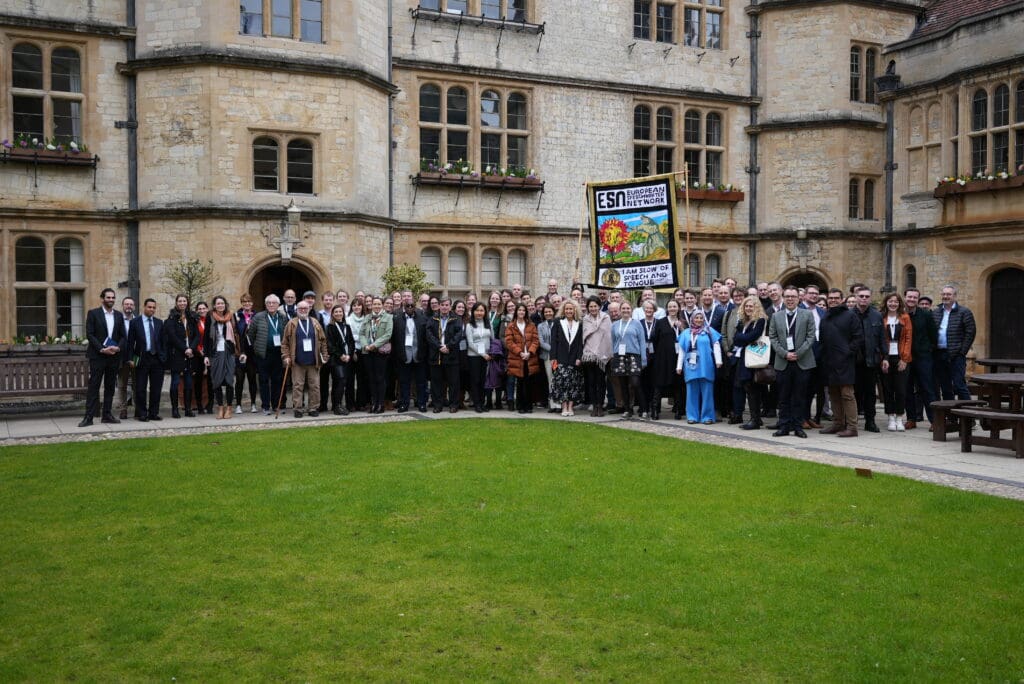
Though the European Speechwriter Network originated as the UK Speechwriters’ Guild, this event had only 22 scribes from the UK. The Netherlands sent 15 speechwriters, Germany sent 11 and France sent nine, with the rest hailing from a variety of countries as far flung as Nigeria, Lebanon and Qatar. I met speechwriters from Denmark, Belgium, Finland, Lithuania, Wales, Ireland—and yes, several from the U.S.
Though most of these people are employed by global, national and regional government organizations, the crowd also included a few corporate folks, some agency people, and several independent writers and speaking coaches.
When you’re trying to please speechwriters of so many stripes, the session subject matter will inevitably be less immediately, specifically applicable to everyday concerns, so variable across cultures and sectors. So the sessions promised less practicality and indulged in more philosophical discussion, leaving delegates to find their own professional applications.
Sessions with laconic titles like, “Writing in the Shadows,” “Writing for Cartoon Characters,” and “Storytelling and the Ocean” brush off the puritan work ethic of the PSA World Conference program, which purports to offer ideas you can take back to work and implement immediately. Even the most stimulating session at this event, a spellbinding hourlong breakdown of the Gettysburg Address by Larry McInerny, director emeritus of the University of Chicago’s Writing Program, left the roomful of working speechwriters with a lot of work to do to apply these principles to their own speeches. Which seemed altogether fine with them.
One thing these folks did seem to have in common was a far greater willingness than participants at a North American conference, to rough it. The impossibly Harry Potter-ish Brasenose College was founded in 1509—George Washington’s great-grandfather graduated from here—and the sleeping rooms occupied by delegates and speakers alike showed it.
Tiptoeing down the hall barefoot to find the bathroom in the middle of the night, or with a towel around one’s waist to shower before dinner: However charming and nostalgically novel this may have been in the doing, I do not believe that PSA logistics chief Benjamine Knight could ever bring herself to put our crowd through it. (Though she joined me on this sortie, and gamely learned to sleep in her squeaky single bed, at least until the dawn-shattering daily trash pick-up outside her window.)
This conference convenes twice a year—once in spring and once in fall—and so, over a little more than a decade, it has met 21 times. It has developed quite a culture, over all those meetings, that was no more vividly displayed than at the formal banquet (!) on the main night of the conference. Dress code, “smart.” The evening includes a traditional after-dinner speaking contest, in which willing delegates in various states of champagne- and wine-braced bravery stand at the head of the dining hall and deliver two-minute toasts that must incorporate certain colorful words chosen from that day’s conference sessions.
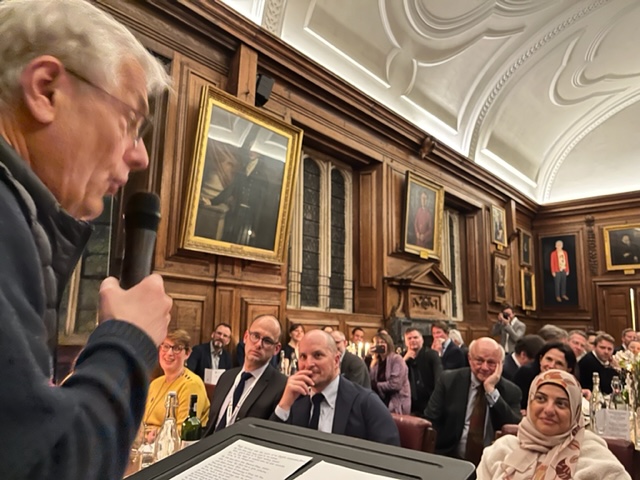
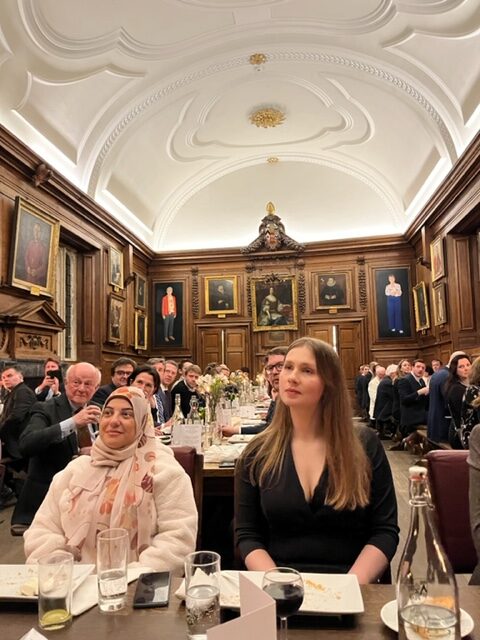
By my estimation, about a quarter of the entire conference took on this challenge, a proportion of hams higher than that at any professional American speechwriting gathering in my long experience. After a dozen or so, the toasts began to run together. The judges, of which I was one, chose the winner partly based on an applause meter.
And the night was young!
We all repaired to what instantly became a teeming tavern in the basement of one of the Brasenose buildings. After which a large contingent of delegates made their way into the village for more merriment, a group of 20 or more of them eventually venturing to a nightclub, where they danced into the very wee hours. Asked the next morning what time he and his revelers returned to campus, a speechwriter for a very large international governmental organization replied, “That is a very good question.” And during a subdued morning session, many of the revelers did not attempt to hide their suffering. The young woman next to me was gigglingly grateful to be told she had put her cardigan on inside out.
Uncharacteristically, I myself was a relative model of moderation, as I was delivering the conference-closing address, about which I had worried a bit, early in the proceedings. I thought it might come off as a little too solemn, a little too earnest for this event, which is kept studiously light by the effervescent emcee Guy Doza, and packed with pithy quips, as when Irish speech consultant James McCabe casually defined comedy as “tragedy that happens to someone else.”
But the culture of this event is large enough to contain multitudes of moods and personalities—from the keynoter, from the beloved and formidable Dutch speechwriter and speechwriting trainer Renée Broekmeulen, to the married British storytelling workshop legends Martin Shovel and Martha Leyton—to the proudly quirky European Speechwriter Network founder Brian Jenner, whose explosive laughter bounced off the stone walls all through these collegiate courtyards, all conference long. Jenner boasts that he gives his customers something more than a “Hilton conference experience.” Yes, he certainly does.
Of course this event and the PSA World Conference aren’t entirely different, as speechwriters’ dilemmas are the same all over. Which political battles are worth fighting, and which are not? How to protect a carefully written speech from bad instincts of the speaker and of “other people with bright ideas,” as Anita Furu, the former speechwriter to the Danish Prime Minister put it. How to make sure speechwriters use their rhetorical powers for good, rather than for evil. “Who should I be using this stuff for?” asked veteran energy-industry speechwriter Lech Mintowt-Czyz in an impromptu lecture on speechwriting ethics. “We’re not kids in sweet shops. We’re kids who have been handed a gun.”
And how to serve clients well—sometimes, despite them. “It’s hard when you’re writing for someone who is not only a poor speaker, but actually doesn’t want to speak at all,” said former German Chancellor Angela Merkel’s longtime speechwriter Jörg Hackeschmidt. “Which brings us to Angela Merkel.”
Angela Merkel, or any other head of state, CEO, university president or nonprofit director you work for, wherever you work in the world.
As the head of the Professional Speechwriters Association, obviously I don’t want you to spend your annual budget dollars and precious time to attend the European Speechwriter Network conference, when you could spend it at our World Conference. I also hope many of the people who attended this Oxford conference eventually make their way across the ocean to further cross-pollinate the speechwriting business.
But you really ought to go to this event once, perhaps pairing the professional trip with a personal vacation. “Speechwriting tourism,” Jenner calls it.
Why? Mostly, because it’s just one hell of a lot of fun.


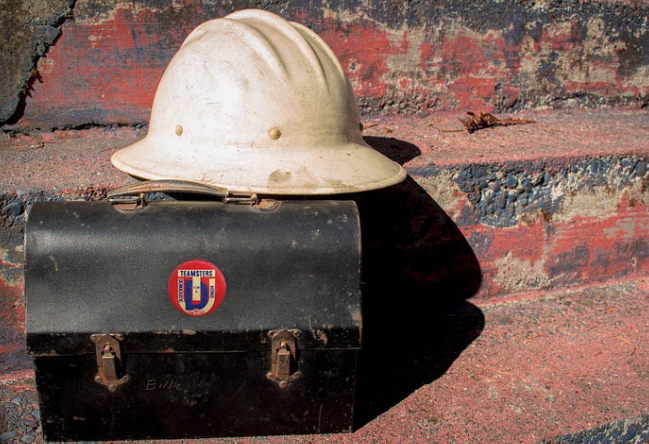
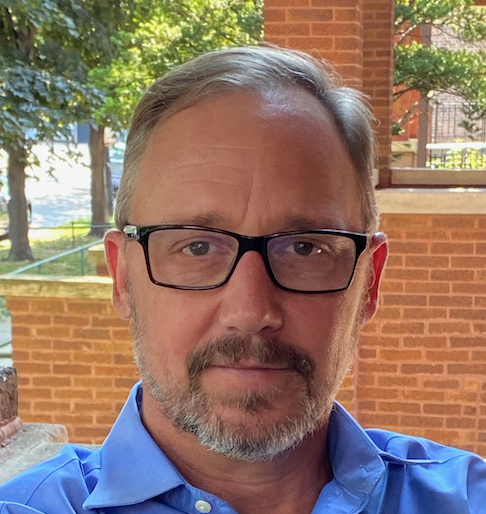
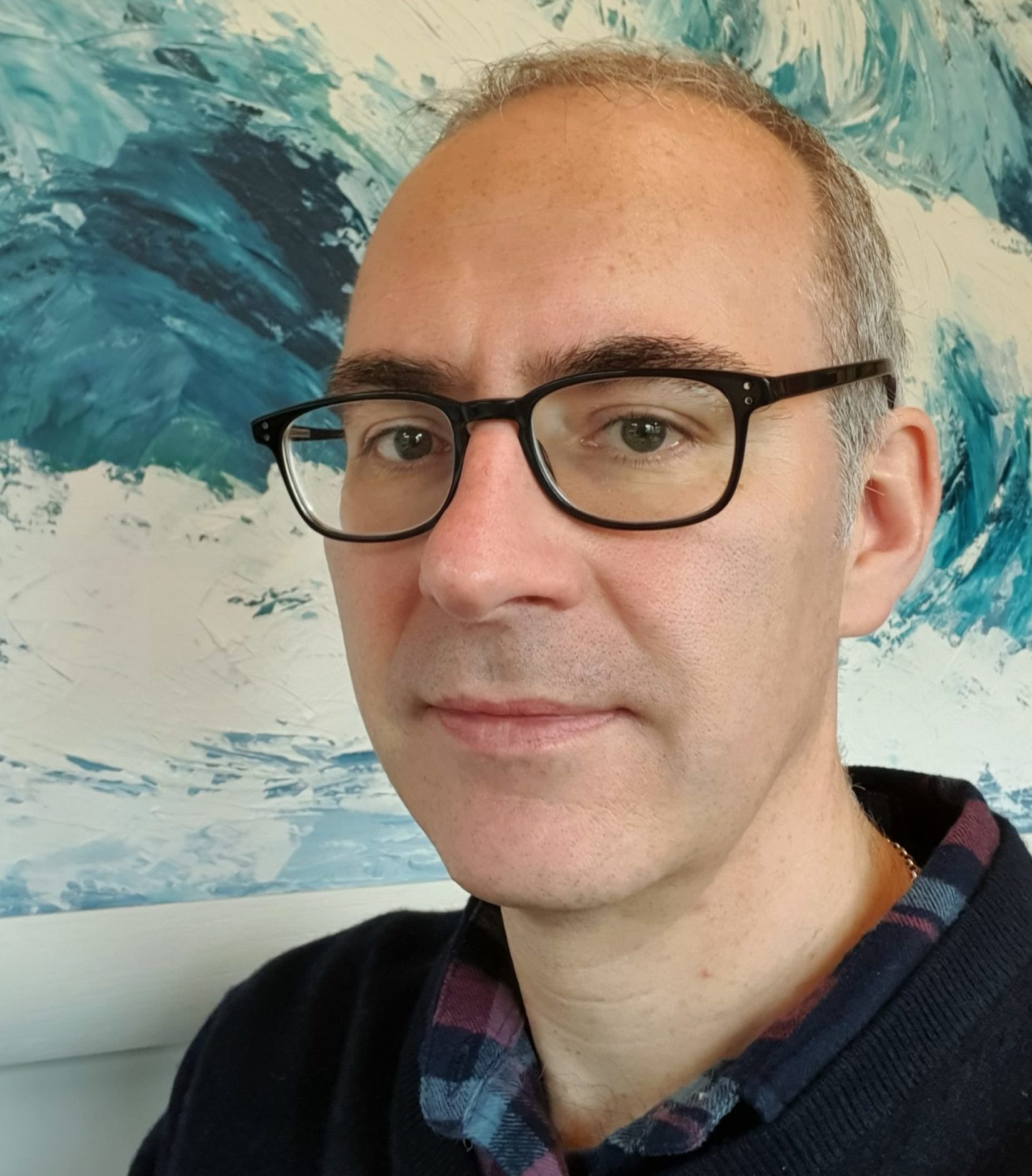
It was a total joy to have you with us David. I think you’ve captured the distinct atmospheres of the two conferences perfectly. Both are fabulous and a total treat.
Until next time,
Lech